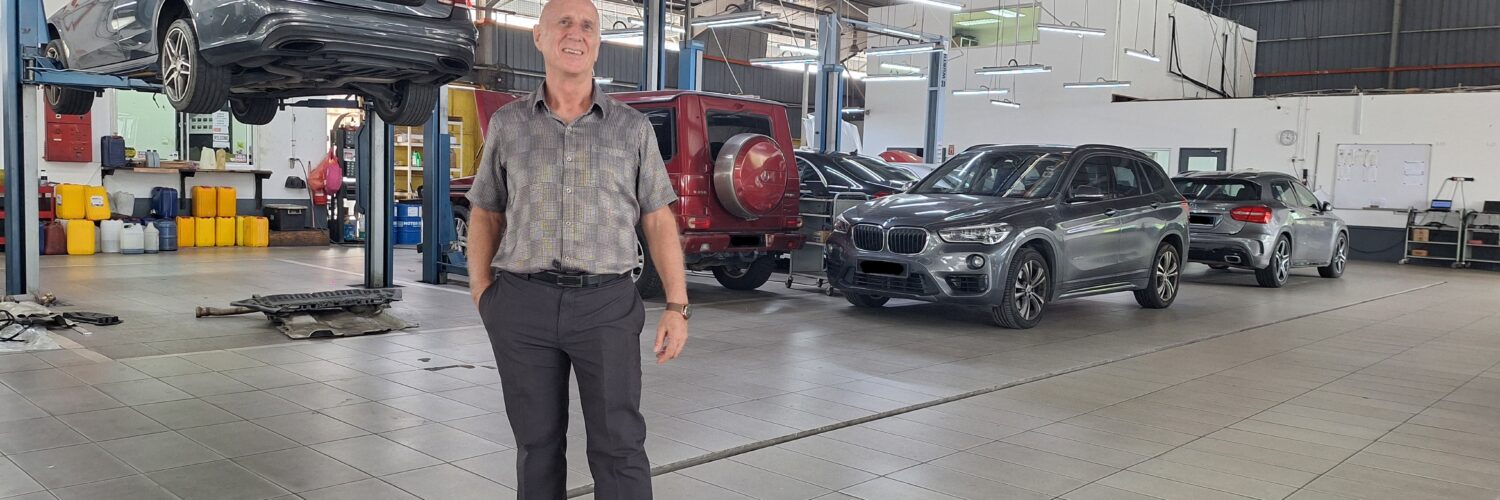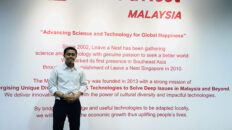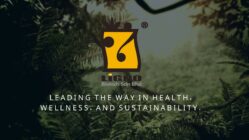For most of us, workshops are transactional spaces—functional, impersonal, a necessary stop in the life of a car. But from the moment I walked in, the smile that greeted me was unexpectedly warm. It was the kind of welcome that quiets scepticism. The team at the front desk looked puzzled—I wasn’t there to service a car but to conduct an interview. Soon enough, I found myself sitting across from the man behind it all—Fritz Imbacher, the Founder and Chairman of German Motors Sdn Bhd.
We exchanged pleasantries. Then Fritz stood up, walked over to a side table, and returned holding what I thought might be notes. Instead, he handed me a plaque. It was simple in design, but etched in bold were the words every leader hopes to one day earn: “Thank you for being our boss.”
At that moment, the heart of German Motors revealed itself—not through revenue charts or brand partnerships, but through something quieter and more telling: appreciation. What made Fritz tick was crystal clear—people and relationships.
A Journey from Innovation to Legacy
The story of German Motors began in 2005 when a major German car company seconded Fritz to oversee a dealership in Malaysia. What was supposed to be a short three-year assignment turned into something deeper. “I didn’t come to Malaysia thinking I would stay, let alone open my own company,” Fritz told me.
But then, he saw an opportunity—specifically in the luxury automotive after-sales segment.
Car owners whose warranties had lapsed had few trusted alternatives. Most workshops lacked the finesse, transparency, and customer connection that discerning car owners sought. Fritz saw the space for something better: a workshop with the rigour of a German service centre delivered with the warmth of a family business. And so, German Motors was born—built on a promise of competence, trust, and genuine service.
Trust as the Cornerstone of Service
Trust is not given—it’s earned.
Fritz Imbacher, Founder and Chairman, German Motors Sdn Bhd
Trust is fragile in the automotive world, where fears of hidden costs and subpar work loom large. At German Motors, it’s built through transparency. If a quotation is lower than expected, they explain why. If a mistake is made, they admit it and make it right. This culture of honesty doesn’t just repair cars—it builds relationships. And it shows. Their customers come back. Again and again.
This culture is most evident in how the team handles the unexpected. “If something goes wrong, we own it,” Fritz emphasised. “That’s how long-term relationships are built.”
Reliable, Professional, Personal
To Fritz, professionalism goes beyond skill—how that skill is applied. Modern vehicles are more than mechanical marvels; they’re moving computers. “Some cars have up to 90 control units,” he explained. “Each one is a powerful computer.”
Servicing these machines requires far more than a wrench and experience. It requires a deep understanding of mechanics, electronics, hydraulics, and software. A team he trained across disciplines reflects that. “There’s no room for shortcuts here,” he added.
This ethos traces back to the Meister tradition in Germany, where master craftsmen are educated not just in repairs but also in management, mentorship, and customer psychology. It’s a holistic approach, and Fritz brought that with him.
While German Motors is known for its expertise in luxury European brands—BMW, Mercedes-Benz, Porsche, Rolls-Royce, Bentley—it doesn’t limit itself by badge. “We’ve even worked on a Perodua Kancil,” Fritz enthused. “It’s not about the brand—it’s about the complexity of the service.” Some cars require advanced diagnostic tools. If they don’t have the equipment or expertise for a particular job, they don’t guess. They tell the customer. That honesty sets the tone.
Investing in People, Not Just Tools
The company began with just five employees. Today, a team of 24 service a steady stream of high-performance machines and loyal clientele. But what matters most, Fritz insisted, is not the number of cars or the workshop size—it’s the people. “You can have the best tools and facilities. Without the right people, you have nothing.”
That belief shapes everything—from hiring philosophy to daily operations. When recruiting, they look beyond résumés. “We don’t care if someone has 10 years of experience. We care if they want to learn.”
One of the best examples is Faizal, the workshop manager, who has been with Fritz from the start. Described as a “sponge for knowledge,” Faizal embodies the self-driven learning culture that German Motors cultivates. Training is constant, mentorship is ongoing, and ownership of one’s growth is expected.
Managing Challenges and Changing Behaviours
Like many businesses, German Motors wasn’t immune to the aftershocks of the pandemic. In the months following COVID-19, customer behaviour shifted noticeably. Routine services like oil changes became less frequent and were replaced by more complex, often urgent repairs.
“People were holding back,” Fritz explained. They’d try cheaper workshops first, but when the problems got serious, they came back to us.” This pattern highlights both the realities of economic pressure and the enduring value of trust. For Fritz, the message to customers is simple: invest in quality before the cost of neglect catches up.
“You might pay a little more upfront, but we’ll give you advice that can save you thousands in the long run,” he said. “So just drop the car off, and let us have a look.”
Adapting to this new landscape meant more than just changing service strategies. It meant embracing a new kind of visibility. While word-of-mouth remains its strongest asset, German Motors has expanded its online footprint—focusing on Google reviews, digital visibility, and customer feedback to reach new audiences. “Today, people Google before they call,” Fritz said. “We still believe in personal recommendations, but being seen online is now part of how people decide whom to trust.”
As the company looks ahead, it’s doing so with sustainability in mind. “We’ve invested in proper oil traps, government-compliant waste disposal systems, and energy-efficient practices,” Fritz said. We don’t cut corners. It’s the right thing to do—for our customers, our staff, and the environment.”
Preparing for the Road Ahead
Fritz is acutely aware of the industry’s shift toward electric vehicles, but he’s not rushing in. “The EV market is still developing here. It’s not about being first—it’s about being ready,” he said. That means staying current with the latest diagnostic tools, investing in training, and maintaining core competencies in mechanics, electronics, and software.
It’s a quiet kind of innovation—not flashy, but foundational.
A Legacy Rooted in Integrity
Fritz isn’t interested in scaling just for the sake of it. His vision for the future is clear: succession through trust. “I want to hand the company over to those who helped build it,” he said. He’s referring to the loyal team that has walked with him, grown alongside him, and carried the values he holds dear. For Fritz, success isn’t in exit strategies or market share—it’s in continuity, built on character.
Despite his Bavarian roots, Fritz speaks of Malaysia with deep affection. “This is home now,” he said, smiling. “We’ve been here for 20 years. We love it.” It’s not just about business location. It’s about belonging.
A Culture You Can Feel
After the interview, I was given a tour of the workshop. I expected clamour and chaos. What I found was calm.
Yes, engines hummed, and there was technical chatter. But the floor was spotless, the air was clean, tools were in place, and movements – purposeful.
There was no shouting. No rush. Only rhythm.
What struck me most wasn’t the equipment or the high-end models. It was the atmosphere—one of pride, precision, and peace.
The team knew their craft. They trusted one another. They knew why they were there.
That, more than anything, is the legacy of German Motors.








